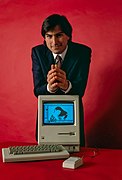The Internet PortalThe Internet (or internet) is the global system of interconnected computer networks that uses the Internet protocol suite (TCP/IP) to communicate between networks and devices. It is a network of networks that consists of private, public, academic, business, and government networks of local to global scope, linked by a broad array of electronic, wireless, and optical networking technologies. The Internet carries a vast range of information resources and services, such as the interlinked hypertext documents and applications of the World Wide Web (WWW), electronic mail, telephony, and file sharing. The origins of the Internet date back to research that enabled the time-sharing of computer resources and the development of packet switching in the 1960s. The set of rules (communication protocols) to enable internetworking on the Internet arose from research and development commissioned in the 1970s by the Defense Advanced Research Projects Agency (DARPA) of the United States Department of Defense in collaboration with universities and researchers across the United States and in the United Kingdom and France. The ARPANET initially served as a backbone for the interconnection of regional academic and military networks in the United States to enable resource sharing. The funding of the National Science Foundation Network as a new backbone in the 1980s, as well as private funding for other commercial extensions, encouraged worldwide participation in the development of new networking technologies and the merger of many networks using DARPA's Internet protocol suite. The linking of commercial networks and enterprises by the early 1990s, as well as the advent of the World Wide Web, marked the beginning of the transition to the modern Internet, and generated sustained exponential growth as generations of institutional, personal, and mobile computers were connected to the network. Although the Internet was widely used by academia in the 1980s, the subsequent commercialization in the 1990s and beyond incorporated its services and technologies into virtually every aspect of modern life. (Full article...) Selected articleThe iLoo (short for Internet loo) was a cancelled Microsoft project to develop a Wi-Fi Internet-enabled portable toilet. The iLoo, which was to debut at British summer festivals, was described as being a portable toilet with wireless broadband Internet, an adjustable plasma screen, a membrane wireless keyboard, a six-channel speaker system, and toilet paper embossed with popular web site addresses. The iLoo was also to have an extra screen and keyboard on the outside, and was to be guarded. It was intended as the next in a series of successful initiatives by MSN UK which sought to introduce the internet in unusual locations, including MSN Street, MSN Park Bench and MSN Deckchair. The project was announced by MSN UK on April 30, 2003, and was widely ridiculed before being declared a hoax by Microsoft on May 12. On May 13, another Microsoft press release stated that although the project had not been a hoax, it had been cancelled because it would do little to promote the MSN brand. There has since been speculation as to whether the project was cancelled for fear of being sued by Andrew Cubitt, who had invented the similarly named product "i-Loo". The iLoo was described as a public relations "debacle" by Online Journalism Review. Selected picture Wardriving is the act of searching for Wi-Fi wireless networks by a person in a moving vehicle using a Wi-Fi-equipped computer, such as a laptop or a PDA. It is similar to using a radio scanner, or to the amateur radio practice of DXing. News
Wikinews Internet portal
WikiProjects
Did you know (auto-generated) -
Selected biography
Douglas C. Engelbart (born January 30, 1925 in Oregon) is an American inventor of Swedish and Norwegian descent. As a World War II naval radio technician based in the Philippines, Engelbart was inspired by Vannevar Bush's article "As We May Think". Engelbart received a Bachelor's degree in electrical engineering from Oregon State University in 1948, a B.Eng. from UC Berkeley in 1952, and a Ph.D. in EECS from UC Berkeley in 1955. At Stanford Research Institute , Engelbart was the primary force behind the design and development of the On-Line System, or NLS. He and his team at the Augmentation Research Center developed computer-interface elements such as bit-mapped screens, groupware, hypertext and precursors to the graphical user interface. In 1967, Engelbart applied for and later received a patent for the wooden shell with two metal wheels (computer mouse). Engelbart later revealed that it was nicknamed the "mouse" because the tail came out the end. He would also work on the ARPANET, the precursor of the Internet. In later years he moved to the private firm Tymshare after SRI was transferred to the company. McDonnell Douglas took over the copany in 1982, and in 1986 he left the company. As of 2007, he is the director of his own company, the Bootstrap Institute, which founded in 1988 and located in Fremont, California.
General images -The following are images from various internet-related articles on Wikipedia.
Selected quoteMore Did you know...
Main topics
Featured contentCategoriesRelated portalsThings you can do
Associated WikimediaThe following Wikimedia Foundation sister projects provide more on this subject:
Wikipedia's portalsDiscover Wikipedia using portals |
How Can We Help?























































Recent Comments